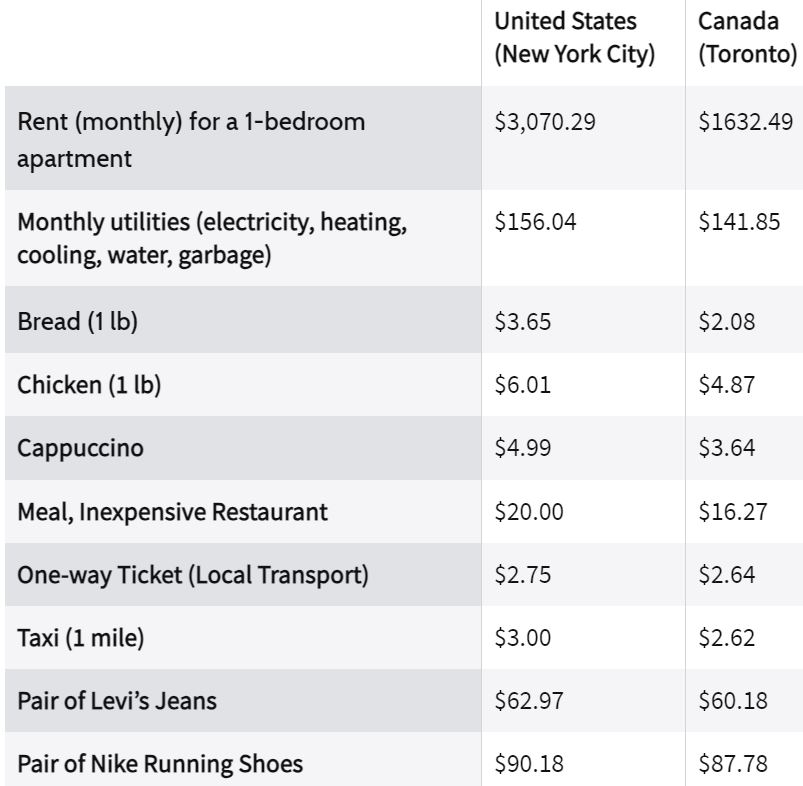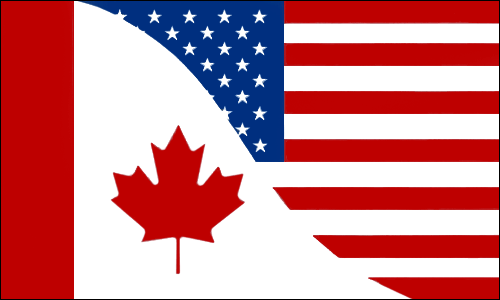Key Differences Between USA and Canada
Culture
The diversity of cultures between Canada and the United States adds a special richness to each country, with subtle nuances. Canadians are widely known for their remarkable politeness, an ingrained quality within their society. This kindness is evident in their focus on collective harmony and natural tendency to apologize – a refreshing change from the assertive individualism often seen in the United States. Canada strongly embraces multiculturalism, valuing diversity and inclusivity. In contrast, the United States emphasizes the “melting pot” concept, promoting the fusion of diverse cultures into a united American identity. Despite these distinctions, both nations share a history and core values rooted in democracy.
Cost of Living in Canada vs USA
The cost of living is an important factor to consider. On average, living in the USA is more expensive than living in Canada. However, these costs vary significantly within each country as well. There may be higher expenses in Canada, such as food and real estate, but there are also higher costs in the USA for healthcare and education.
Residing in large cities in either country can be expensive, however, when comparing between borders, the USA is seen as the costlier choice. The cost of groceries, rent, and dining out tends to be higher in the USA compared to Canada. However, clothing prices are typically more reasonable in the USA and wages are generally higher. It’s important to take into account that Canada has higher taxes than the USA, which can impact the overall cost of living. Nevertheless, depending on individual circumstances, the USA may still end up being the more budget-friendly option.

Healthcare
Healthcare is a major consideration when choosing between Canada and the USA. The US is known for having the most expensive healthcare system worldwide, with an average annual spending of $11,172 per person. In America, healthcare is typically linked to employment, resulting in discrepancies in coverage and accessibility. Those without insurance may struggle to afford necessary healthcare. While the Affordable Care Act (ACA) has extended coverage for many Americans, issues of unequal access and affordability remain.
In contrast, Canadians have a per capita healthcare expenditure of $7,064. Despite offering access to top-notch medical facilities, affordability remains a challenge for many Americans. Meanwhile, in Canada, healthcare is funded by the government through taxation, resulting in a universal system that grants all residents access to essential medical services without hefty personal expenses. Typically, Canadians have a primary care physician who acts as a gateway to specialized treatments and services.
Education
Both the USA and Canada have similar education systems, with state education being the norm. However, their university systems differ. In Canada, tuition fees are significantly lower compared to the USA, making it a more budget-friendly choice for those pursuing higher education. While the USA has many renowned private universities, including the prestigious Ivy League schools, attending them can be costly. Fortunately, there are scholarships and financial aid options available in the USA to help alleviate expenses. Ultimately, deciding between these two countries depends on your educational aspirations and financial circumstances.
Climate and Nature
A wide variety of landscapes and climates exist in the United States and Canada. Being closer to the equator, the USA is generally warmer and has a higher population density than Canada. Adventure enthusiasts, however, love Canada because of its unique natural wonders and outdoor recreational opportunities.
Average Daily Maximum Temperatures per Year

The climate disparity between Canada and the United States varies greatly across both countries. Known for its diversity, Canada’s temperatures are typically colder compared to the US. In the northern regions like Yukon and Northwest Territories, winters can be extremely harsh with below-freezing temperatures. However, cities in the south, such as Vancouver and Toronto, experience milder climates. Canada also receives significant amounts of snowfall, particularly in central and eastern provinces during winter, creating picturesque winter landscapes. Some of the largest Canadian cities that receive high levels of snow annually include St. John’s, Saguenay, Québec City, Sherbrooke, and Moncton.
Because of its extensive geographical diversity, the United States exhibits a more diverse climate. Alaska and the northern Midwest, for example, have harsh winters similar to those in Canada. As a result, southern states generally have milder winters and warmer temperatures. Arid areas, like the southwestern states, experience lower precipitation and areas with high rainfall in U.S. weather patterns.
If immigrants are heading north, they should be prepared for colder temperatures and significant snowfall, depending on their region.
Languages
In spite of their subtle differences, language distinctions between Canada and the United States reflect the unique linguistic fabric of each country. Although English is the primary language in both countries, Canadians sometimes use British English spellings, which provides a delightful departure from American convention. Canada has a bilingual nature, particularly evident in Quebec, which introduces French as an official language, enhancing its linguistic diversity.
However, the United States adopts English mainly and without significant regional influences. Although English is the official language, a variety of languages have emerged as the most popular ones in the country, mostly because of immigration. Among non-English languages spoken in U.S. households, Spanish accounted for 62% in 2019. This surpassed Chinese, Tagalog, Vietnamese, and Arabic as the fourth most common language.
Individuals seeking to live on the francophone side of Canada can benefit from recognizing and appreciating the linguistic diversity within each province to enhance effective communication and enhance their experience. Besides improving job prospects, this also gives you a chance to interact more effectively with francophones living in Canada.
Visas and Immigration
It is imperative to consider the immigration process when making a decision to move. The USA has a complex immigration system that can be difficult to navigate. As a result, Canada is generally considered more accessible since it has a more streamlined immigration system, particularly through Express Entry.
Lifestyle
Factors such as work-life balance, vacation time, and general quality of living should also be taken into account when making your decision. Canada follows European standards with its generous work hours and vacation time, while also boasting cleaner air and a longer life expectancy. Additionally, a high percentage of Canadians hold passports, allowing for convenient international travel. On the other hand, the USA may offer a more fast-paced lifestyle but has higher levels of air pollution and a slightly lower life expectancy. These factors play a role in the differences in lifestyle between the two countries.
Public Goods & Services
Public goods and services can play a significant role in determining the cost of living. For instance, Canada offers universal healthcare, while most of the USA’s healthcare requires costly insurance. For education, Canada has lower average university tuition, while the USA has more programs and institutions.
Choosing Your North American Adventure
Ultimately, the decision between Canada and the USA is a highly personal one, based on your specific preferences, priorities, and situation. Key economic considerations, such as income levels, taxes, and the cost of living, are crucial factors to take into account. In addition to these, aspects like family benefits, healthcare options, educational opportunities, climate conditions, cultural atmosphere, and immigration processes also play a significant role in the decision-making process. Ultimately, it is vital to align your choice with your individual values, goals, and lifestyle preferences. Both countries offer exceptional prospects for growth and exploration in dynamic environments that can make it difficult to determine where to establish roots.
In conclusion
choosing between Canada and the USA is a highly personal decision, dependent on individual values and priorities. While Canada offers a multicultural, affordable, and healthcare-centric environment, the USA provides diverse opportunities and a faster-paced lifestyle. Considerations such as economic factors, healthcare, education, climate, language, immigration, and lifestyle should guide the decision-making process. Ultimately, the choice should align with personal preferences and goals, as both countries offer unique prospects for growth and exploration in dynamic settings.
FAQs:
- Is living in Canada more affordable than the USA?
- On average, living in the USA is more expensive than in Canada, but costs vary within each country. Factors such as taxes, healthcare, and education should be considered when assessing overall affordability.
- How does healthcare differ between Canada and the USA?
- The USA has a more expensive and employment-linked healthcare system, while Canada offers universal healthcare funded by the government through taxation. Affordability and accessibility remain challenges in the American healthcare system.
- What are the key language differences between Canada and the USA?
- While English is the primary language in both countries, Canadians may use British English spellings. Canada also has a bilingual nature, with French as an official language in Quebec. The USA primarily adopts English, but a variety of languages are spoken due to immigration.
- How do the education systems compare between the two countries?
- Both countries have similar state education systems, but university tuition is significantly lower in Canada compared to the USA. While the USA has prestigious private universities, attending them can be costly.
- What factors should be considered when deciding between Canada and the USA?
- Individual values, goals, and lifestyle preferences are crucial. Economic factors, including income levels and the cost of living, play a significant role. Other considerations include healthcare options, educational opportunities, climate conditions, cultural atmosphere, and immigration processes.
- Which country has a more accessible immigration process?
- Canada is generally considered more accessible due to its streamlined immigration system, particularly through programs like Express Entry. The USA has a complex immigration system that can be challenging to navigate.
- How does the lifestyle differ between Canada and the USA?
- Canada offers a more European-style lifestyle with generous work hours, vacation time, and cleaner air. The USA may provide a more fast-paced lifestyle but has higher levels of air pollution and slightly lower life expectancy. Lifestyle choices should align with individual preferences.
- Are there notable differences in climate between Canada and the USA?
- Both countries exhibit diverse climates. Canada generally has colder temperatures, and regions vary from harsh winters in the north to milder climates in the south. The USA’s climate diversity ranges from harsh winters in the north to milder temperatures in the south, with arid and rainy regions. Consideration of climate preferences is essential when deciding where to reside.








